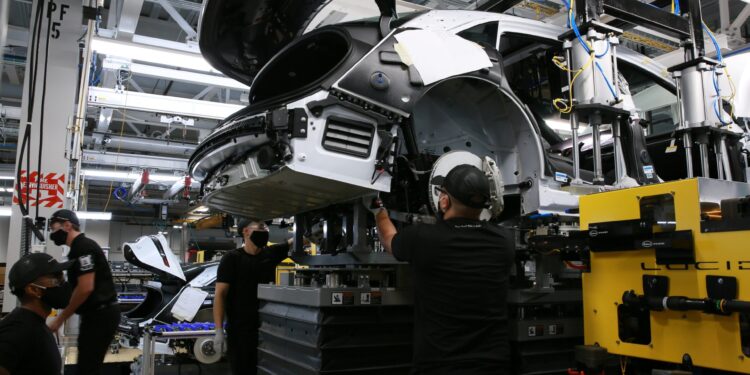Analyzing The Challenges Faced By BMW And Porsche In The Chinese Market

Table of Contents
Intensifying Domestic Competition:
The Chinese luxury car market is no longer solely dominated by international players. The rise of powerful domestic brands and aggressive pricing strategies from established competitors present significant headwinds for BMW and Porsche.
Rise of Domestic Luxury Brands:
The emergence of homegrown electric vehicle (EV) brands like Nio, Xpeng, and BYD is fundamentally reshaping the landscape. These brands are not just offering competitive pricing, but also leveraging advanced technology and appealing to a younger demographic.
- Lower pricing on comparable EVs impacts BMW and Porsche's market share in the luxury segment. Domestic EVs often offer similar features at a significantly lower price point, attracting price-sensitive buyers.
- Advanced technology features in domestic EVs are attracting younger, tech-savvy consumers. These brands are integrating cutting-edge technology, including advanced driver-assistance systems (ADAS) and sophisticated infotainment systems, which resonate strongly with younger generations.
- Strong government support and national pride boost domestic brands' appeal. Government initiatives promoting domestic industries and a growing sense of national pride are fueling the success of these Chinese brands. This creates a powerful wave of consumer preference that international brands must overcome.
Aggressive Pricing Strategies from Established Players:
Beyond the rise of domestic brands, BMW and Porsche also face aggressive pricing strategies from other established international luxury automakers. This creates a highly competitive environment where maintaining profitability becomes increasingly challenging.
- Price wars erode profit margins for BMW and Porsche. The pressure to match competitive pricing from other international brands can significantly impact profit margins, forcing these companies to re-evaluate their pricing strategies.
- The need to match competitive pricing can impact brand perception of exclusivity. Luxury brands often rely on a perception of exclusivity and premium pricing. Engaging in price wars can potentially dilute this carefully cultivated image.
Shifting Consumer Preferences:
Beyond competition, BMW and Porsche are facing a fundamental shift in Chinese consumer preferences. The growing demand for electric vehicles (EVs) and a strong emphasis on technology and digitalization are key drivers of this change.
Growing Demand for Electric Vehicles (EVs):
China's rapid transition towards electric and hybrid vehicles demands significant investment and adaptation from established players. BMW and Porsche must respond to this shift to maintain their relevance in the market.
- BMW and Porsche need to expand their EV portfolios to remain competitive. The lack of a comprehensive EV lineup can limit market share in this rapidly growing segment.
- Charging infrastructure limitations in some regions hinder EV adoption. While infrastructure is improving rapidly, range anxiety and accessibility to charging stations remain potential barriers for some consumers.
- Consumer perception of range anxiety needs to be addressed through effective marketing campaigns. Targeted marketing efforts highlighting the convenience and reliability of their EVs are crucial to address range anxiety and build consumer confidence.
Emphasis on Technology and Digitalization:
Chinese consumers are increasingly tech-savvy and demand advanced features in their vehicles. This necessitates significant investment in technology and digital services.
- BMW and Porsche need to improve in-car technology and digital services. This includes enhancing infotainment systems, integrating advanced connectivity features, and providing seamless digital experiences.
- Integration of local apps and services is crucial for user experience. Catering to local preferences and integrating popular Chinese apps and services is critical for a positive customer experience.
- Data privacy concerns need careful consideration and transparent handling. Transparency and robust data protection measures are crucial to build and maintain consumer trust.
Navigating Regulatory and Political Landscape:
The Chinese automotive market is heavily regulated, and navigating this complex environment requires careful planning and adaptation. Geopolitical factors also present further challenges.
Stringent Emission Regulations:
China's commitment to environmental sustainability is reflected in increasingly stringent emission regulations.
- Meeting stricter emission standards adds to the production costs. Compliance with ever-tightening regulations necessitates significant investments in research and development.
- Compliance with evolving regulations requires continuous adaptation and innovation. BMW and Porsche must proactively monitor and adapt to the changing regulatory landscape to ensure continued compliance.
Geopolitical Factors and Trade Tensions:
Geopolitical uncertainty and trade tensions can create supply chain disruptions and impact market access.
- Supply chain disruptions can lead to production delays and reduced sales. Global supply chain challenges can severely impact production and sales, leading to shortages and potentially lost revenue.
- Navigating trade policies and tariffs adds complexity to operations. Understanding and adapting to changing trade policies and tariffs is essential for successful operation in the Chinese market.
Conclusion:
BMW and Porsche face substantial Chinese luxury car market challenges. The rise of domestic brands, shifting consumer preferences towards EVs and advanced technology, and a complex regulatory environment all contribute to a highly competitive landscape. To succeed, these brands need to adapt strategically by investing in electric vehicle technology, enhancing their digital offerings, and actively addressing evolving consumer demands. Understanding and effectively addressing these Chinese luxury car market challenges is crucial for maintaining a strong presence and achieving sustainable growth in this vital market. Continued analysis of the Chinese luxury car market is essential for developing successful long-term strategies. Ignoring these challenges risks significant market share erosion for these iconic brands.

Featured Posts
-
 Nl Federal Election Getting To Know Your Candidates
May 10, 2025
Nl Federal Election Getting To Know Your Candidates
May 10, 2025 -
 West Bengal Madhyamik Result 2025 Merit List And Analysis
May 10, 2025
West Bengal Madhyamik Result 2025 Merit List And Analysis
May 10, 2025 -
 Severe Mental Illness And Violence Addressing Academic Shortcomings
May 10, 2025
Severe Mental Illness And Violence Addressing Academic Shortcomings
May 10, 2025 -
 Harry Styles Devastating Reaction To A Bad Snl Impression
May 10, 2025
Harry Styles Devastating Reaction To A Bad Snl Impression
May 10, 2025 -
 The Casting Of David In High Potential Episode 13 An Analysis
May 10, 2025
The Casting Of David In High Potential Episode 13 An Analysis
May 10, 2025
